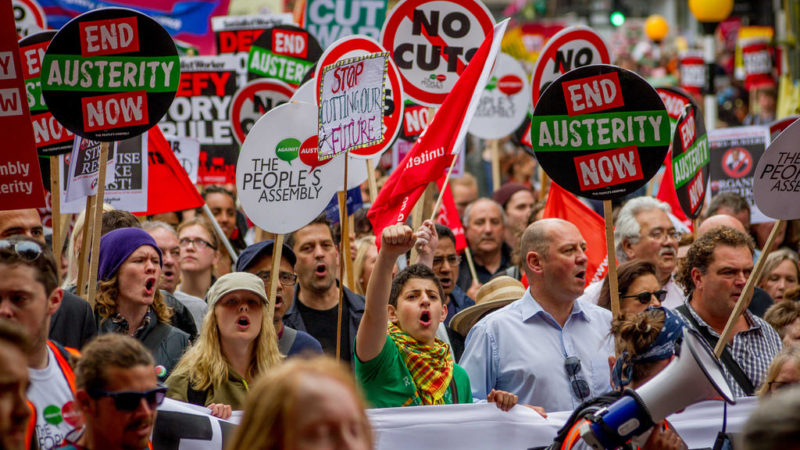After nearly a decade of chronic underfunding, our public services are in crisis - and women have been hit hardest.

The government has indicated that we are to expect spending increases in next week’s Spending Review, after promises by the previous Chancellor that austerity was ‘coming to an end’.
We still do not know what that will mean in real terms, particularly for women who have borne the brunt of austerity policies since 2010.
Women have been disproportionately impacted by cuts in benefits and public spending, and have received less in tax cuts than men, with BAME women and disabled women hardest hit.
This is the result of structural inequalities which mean women earn less, own less and have more responsibility for unpaid care and domestic work.
Some of the key policy areas affecting women are:
1. Public services, including health, education and care services, which are under increasing strain after two previous rounds of spending reductions. Women are more likely than men to need public services, more likely to work in the public sector and more likely to have to increase their unpaid work when services are cut.
2. The majority of public services are provided by local councils, but over the past eight years local councils have seen a reduction of up to 49% in their central government funding. Women and children bear the brunt of these cuts as they are more likely to work for councils and to need a range of council provided services, including social care, transport and housing, directly for themselves or indirectly for others for whom they care. These services are vital in affording women the opportunity to participate fully in the economy.
3. Social care is widely recognised to be in crisis. The majority of the care workforce, paid and unpaid, are women and the majority of those in need of care are women.
4. Cuts to social security since 2010 will have cost £39 billion per year by 2021. These cuts affect women more than men because of their generally lower incomes and greater caring responsibilities.
5. Austerity measures have reduced funding available for women’s organisations. At the same time cuts to statutory services and social security have increased the demand on the voluntary sector.
This Spending Review presents a critical opportunity for the government to reverse its previous disastrous austerity programme and invest in policies to improve women’s lives.
With on-going uncertainty over what shape Brexit will take, and with “no deal” looking increasingly likely, this Spending Review is taking place in an increasingly fragile context.
Continued worries about the state of the world economy and the UK’s place within it mean the government should take this opportunity to invest in social infrastructure, particularly the care sector, which would not only address the urgent crisis in care but would also boost employment and reduce the gender employment gap.
Such investment could include, among other things, provision of free universal child-care and a significant boost in funding for education and health (with a sufficiently ring-fenced mental health budget), that properly reflects the benefits society reaps from these services.
There is also a gender impact of the distribution of spending between departments – in addition to the impact of more nuanced department level spending decisions – for which the Treasury has to take responsibility. Not only will this enable the government to fulfil its Equality Duty, but such analysis can be used to inform spending decisions which aim to reduce rather than further exacerbate inequality between women and men.
We urge government to carry out equality impact assessments (EIAs) of the spending plans of individual departments and for the Treasury to take responsibility for carrying out an EIA of the Spending Review as a whole.
In addition, we urge the government to address the need to plan for and fund issues which cut across multiple departments such as Violence Against Women and Girls as recommended in the Institute for Government’s Spending Review report.
After nearly a decade of chronic underfunding, our public services are in crisis. An increasingly penurious welfare system is failing the most vulnerable in society, and severe cuts to local council funding and funding for other public services have led to the steady deterioration of our social infrastructure.
To reverse this, we need an end to austerity. That means more than simply an end to budget cuts or a few headline-grabbing measures to increase funding in areas where there has been media attention.
This is taken from a briefing by Emma Williams, Women’s Budget Group. Read the full analysis here.




4 Responses to “Women’s Budget Group: The government must fulfil their promise to end austerity”
nhsgp
Would 220 bn a year in extra spending help?
You can’t have it. 220 bn a year goes on the state debts, most being pensions, and borrowing caused by lots of spending.
Norah Cowpe
Keep up the fight ladies!
Juls
And to rub salt in the wound, women born in 1950’s have lost their right to state pension at 60!!! Without adequate prior notice!!! The government have literally stolen a decade of money from millions of women who have worked their whole lives for this benefit later in life. Its a disgrace!!!
Media Round-up: August 2019 - Womens Budget Group
[…] Foot ForwardWomen’s Budget Group: The government must fulfill their promise to end austerity30th August […]